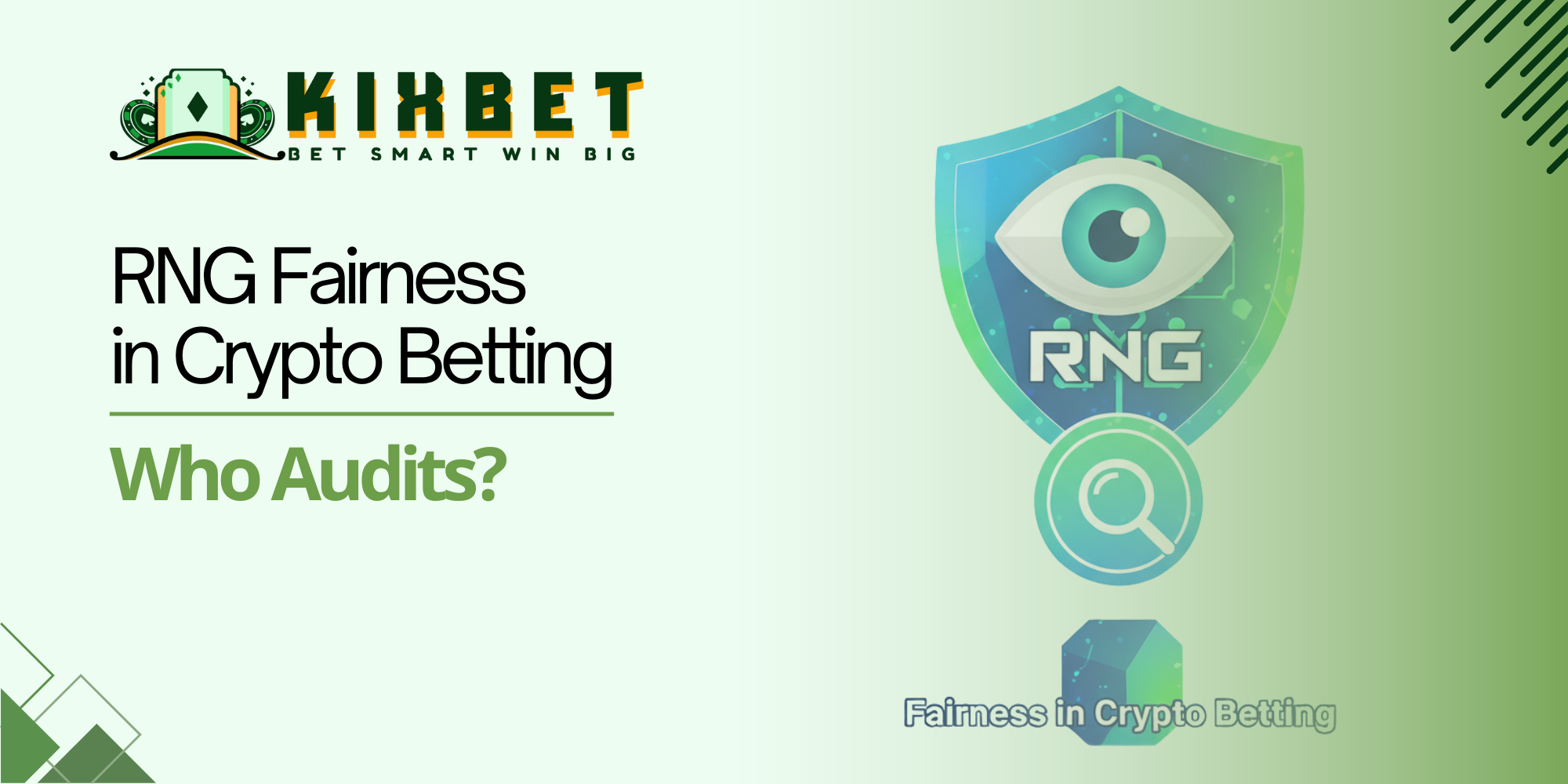What RNG Means in Crypto Betting
In crypto betting, outcomes depend on an RNG. The generator drives dice rolls, slot spins, and card shuffles. Consequently, fair computation is essential and non‑negotiable.
Unlike physical dice, digital games rely on software to create randomness. The engine must be unpredictable, unbiased, and resilient to tampering. Furthermore, it must be tested, certified, and monitored over time.
Crypto platforms often add “provably fair” tools. These allow players to verify each result with cryptographic proofs. Even so, external audits remain a core control. Independent review validates not only the math but also the environment in which it runs.

RNG Fairness in Crypto Betting: Who Audits?
How RNG Works: PRNG, CSPRNG, Hardware, and Provably Fair
Randomness in software usually begins with a PRNG, or pseudo‑random number generator. It uses algorithms to produce sequences that look random. However, a weak seed or poor implementation can allow prediction. Therefore, serious platforms avoid fragile designs.
By contrast, a CSPRNG is designed for security. It resists prediction even when the algorithm is public. It draws entropy from operating system events and, at times, from hardware. As a result, it is the standard choice for regulated gaming and for modern crypto casinos.
Some teams add hardware sources such as thermal or electrical noise. These can improve entropy. Nevertheless, physical devices can drift with age. Consequently, calibration, health checks, and audits are necessary.
Meanwhile, provably fair systems provide transparency at the bet level. Typically, the site publishes a hash of a secret server seed, accepts a client seed from the player, and uses a nonce that increments per bet. A one‑way function, often HMAC with SHA‑256, maps combined values to game outcomes. After rotation, the server seed is revealed so players can verify previous results. This is helpful. Yet it does not replace independent certification of the generator or the platform’s controls.
Why RNG Fairness Matters
Trust is the foundation of any betting product. Players want a level playing field. Operators need integrity for licensing and payment access. Moreover, crypto moves money quickly, so confidence becomes even more important.
Because of that, responsible brands invest in RNG audits and publish seals. They also document change control and versioning. In turn, these steps reduce suspicion, satisfy regulators, and improve retention.
Who Audits RNG in Online and Crypto Casinos
Independent testing labs review the generator, the integration, and the operations around it. They also verify that updates do not degrade fairness. Below are widely respected names.
eCOGRA
eCOGRA is a recognized testing lab and standards body. It evaluates randomness engines, verifies game RTP, and reviews operational controls. Explore services at ecogra.org.
Gaming Laboratories International (GLI)
GLI collaborates with regulators and suppliers worldwide. It publishes technical standards and certifies games and platforms. Details are available at gaminglabs.com.
iTech Labs
iTech Labs focuses on randomness testing, RTP checks, and platform audits. It also hosts many public certificates. Visit itechlabs.com for examples.
BMM Testlabs
BMM provides certification across multiple jurisdictions. It assesses algorithms, mappings, and security controls. Learn more at bmm.com.
QUINEL
QUINEL conducts audits for suppliers and operators in many markets. It performs ongoing compliance and game approvals.
These labs are typically accredited to ISO/IEC 17025. That accreditation signals rigorous methods and quality management. Consequently, it raises confidence in test results.
How Auditors Test and Certify RNG
Independent labs rely on multiple lines of evidence. In practice, they combine statistical analysis, code review, and operational checks. This layered approach limits blind spots.
RNG Statistical Testing
Auditors generate large datasets and run batteries of tests. These include frequency, runs, serial correlation, entropy, and uniformity checks. Where applicable, they align with guidance from NIST (for example, SP 800‑22) and use suites such as Dieharder or TestU01. Together, these methods identify bias, streaks, or structure.
RNG Algorithm and Code Review
Reviewers inspect the algorithm, seeding, reseeding, and state handling. They examine libraries and parameters. Even minor errors can skew results. Therefore, careful inspection is critical.
Environmental and Operational Controls
Fair outcomes also depend on secure operations. Labs review server hardening, deployment pipelines, change control, and access rights. They verify seed generation, key management, logging, and monitoring. As a result, they reduce the risk of manipulation in production.
Game Integration and Mapping
Sometimes the generator is fine, but the mapping from numbers to game outcomes is flawed. Auditors test that mapping and confirm the final distribution matches the design. They also check edge cases to prevent exploits.
Certificates, Seals, and Surveillance
After successful testing, labs issue a certificate. This may include version numbers, hashes, and scope. Many seals are clickable and lead to a live page on the lab’s site. Importantly, certifications can expire or apply only to specific versions. Hence, periodic re‑testing and surveillance audits are standard.
RTP vs RNG: Avoiding Confusion
RTP, or return to player, is a long‑term expected payout percentage. The generator produces the random outcomes that drive that expectation. A title can advertise 96% RTP yet still be untrustworthy if randomness is biased. Conversely, a fair generator will not guarantee short‑term wins. It only ensures unbiased draws.
Therefore, evaluate both. Confirm certification for the generator and review RTP testing. Together, these signals build a clearer picture.
Regulatory Oversight and RNG Requirements
Many jurisdictions mandate independent testing. They also set rules for change management, incident response, and player protection. Although details vary, the theme is consistent: fairness is mandatory.
United Kingdom
The UK Gambling Commission publishes technical standards and testing policies. Licensees must use approved test houses. Guidance is available at gamblingcommission.gov.uk.
Malta
The Malta Gaming Authority runs a large iGaming framework. It requires certification and ongoing compliance reviews. See mga.org.mt.
Kahnawake
The Kahnawake Gaming Commission has regulated online gaming since 1999. It demands fair games and approved testing. Visit gamingcommission.ca for documents.
Isle of Man
The Isle of Man Gambling Supervision Commission oversees technical standards and player safeguards. Licensees must prove compliance.
New Jersey (USA)
The New Jersey Division of Gaming Enforcement defines strict online gaming controls. Its policies influence broader best practices.
Across markets, labs often hold ISO/IEC 17025 accreditation. That standard confirms competence and quality in testing. Accordingly, many regulators recognize or require it.
Provably Fair vs Independent Audits
Provably fair tools let you confirm individual outcomes using cryptography. They improve transparency and reduce blind trust. However, they do not review deployment pipelines, staff access, or operational security. Nor do they validate the full platform.
Independent audits address those gaps. Reviewers evaluate the generator, the game mappings, and the environment. They also confirm that updates preserve fairness. Consequently, the strongest strategy is layered: use provably fair verification alongside third‑party certification.
How Players Can Verify RNG Audits
With a few quick checks, you can validate claims before you play. These steps are simple and effective.
Check the RNG Seal
Look for an eCOGRA, GLI, iTech Labs, BMM, or QUINEL badge. Click it. A genuine seal opens a certificate page hosted by the lab. It should show the operator or game, the scope, and the status. If it is only an image, be careful.
Validate RNG Details
Confirm software versions and dates on the certificate. Compare them with what the site displays. If anything is outdated or mismatched, contact support. Reputable teams will explain and provide timelines for re‑testing.
Read the Provably Fair RNG Docs
Clear documentation should describe server seeds, client seeds, nonces, and hashing. It should also explain seed rotation and verification steps. If the page is vague, consider it a warning.
Confirm the License
Search the regulator’s registry to verify the license. Most authorities offer public lookup tools. This quick step helps you avoid unlicensed operators that copy seals or certificates.
Start Small
Before committing funds, place small bets and verify a few results. Meanwhile, test support responsiveness and withdrawals. If anything feels off, withdraw early.
Common Misconceptions and Red Flags
Several myths persist in forums and chats. Clearing them up can save you time and money.
Myth: “Streaks mean the system is rigged.”
Not necessarily. True randomness produces clusters and streaks. Short runs can look unfair even when the generator is sound. Therefore, judge by long‑term behavior and certification.
Myth: “Provably fair makes audits unnecessary.”
Per‑bet verification helps, but it does not cover code quality or operational security. Audits remain essential for overall integrity.
Red Flag: Static images as seals
Authentic badges link to a lab page. If a logo is not clickable or resolves to the casino’s domain, treat it with caution. Additionally, watch for expired dates and mismatched names.
Red Flag: Vague technical pages
Reliable sites publish concrete details. Look for hashing algorithms, seed rotation schedules, and verification steps. If those are missing, pause and review alternatives.
Trends and Emerging Tech
Innovation in randomness continues across Web3 and iGaming. New methods aim to improve transparency without adding excessive latency or cost.
For instance, Chainlink VRF delivers verifiable randomness to smart contracts. Each value comes with a proof that users can check on‑chain. This reduces manipulation risks. However, it adds fees and timing constraints, so it suits some games better than others. Learn more at chain.link/vrf.
Another direction is hybrid entropy. Teams mix operating system entropy, hardware noise, and external beacons. Some even consider public randomness beacons such as the NIST Randomness Beacon. Done well, this adds resilience. Yet it also increases complexity, so audits become even more important.
Looking ahead, developers monitor post‑quantum research. Today’s secure generators remain robust. Nevertheless, periodic reviews and algorithm agility will help platforms adapt if threat models change.
FAQs
What is RNG in crypto betting?
RNG stands for random number generator. It produces unpredictable values that determine game outcomes. Without it, digital games could not model chance fairly.
Who audits these systems?
Independent labs such as eCOGRA, GLI, iTech Labs, BMM Testlabs, and QUINEL. Regulators often require testing by approved or accredited organizations.
Is provably fair the same as an audit?
No. Provably fair validates individual outcomes. An audit validates the algorithm, the code, and the operational environment.
How often should certification be renewed?
Timelines vary by jurisdiction and product. Typically, audits occur at launch, after major changes, and on a periodic schedule set by regulators or contracts.
Can players test at home?
You can run basic checks on public data and verify provably fair proofs. Deep testing, however, requires access, tooling, and expertise. That is the role of accredited labs.
Does a high RTP guarantee fairness?
Not by itself. RTP is an expected average over time. Fair randomness ensures unbiased draws. You need both to trust outcomes.
Bet88
Check out Bet88 promotions.
Stake
Check out Stake promotions.
BetOnline
Check out BetOnline promotions.
Conclusion
RNG fairness underpins trust in crypto betting. Nonetheless, trust should rest on evidence. Independent labs test algorithms, code, and controls. Provably fair systems add per‑bet transparency. Together, they create a robust assurance model.
Before you play, check the seal, validate the certificate, read the provably fair page, and confirm the license. Additionally, start small and verify. These simple steps can protect your bankroll and your peace of mind.
The best operators publish results, welcome questions, and treat randomness as critical infrastructure. That mindset is what you should look for.
Check out our Davegas review: Davegas Casino Betting Site: Features and Advantage
Don’t forget to also check out: Solana Payouts: 11 Best Crypto Betting Sites for Fast Payouts
Sources
- eCOGRA — https://ecogra.org
- Gaming Laboratories International (GLI) — https://gaminglabs.com
- iTech Labs — https://itechlabs.com
- BMM Testlabs — https://bmm.com
- UK Gambling Commission — https://www.gamblingcommission.gov.uk
- Malta Gaming Authority — https://www.mga.org.mt
- Kahnawake Gaming Commission — https://www.gamingcommission.ca
- ISO/IEC 17025 Standard — https://www.iso.org/standard/66912.html
- NIST CSRC — https://csrc.nist.gov
- NIST Randomness Beacon — https://beacon.nist.gov/home
- Chainlink VRF — https://chain.link/vrf















